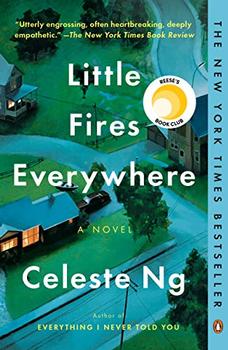Summary | Excerpt | Reading Guide | Reviews | Beyond the book | Read-Alikes | Genres & Themes | Author Bio

In an ideal world, we would each have the freedom to explore our passions, to figure out the kind of person we really are, and then strive to become that person. This basic principle, containing hints of the American ideal of the pursuit of happiness, might have been the foundation of Henrik Ibsen's A Doll's House, a play written more than 100 years ago, but its continuing relevance to contemporary society remains stronger than ever.
The titular "woman" in Claire Messud's new novel, The Woman Upstairs, is even named after the play's iconic heroine, Nora. Our contemporary Nora (Eldridge) is not married however and, at forty-one, is an angry, bitter woman reflecting on her years as an elementary teacher at Appleton Elementary School in Cambridge, Massachusetts.
As a child, Nora dreamed of becoming an artist, not a teacher. Nora's mother, who chose to be a stay-at-home mom, thereby depending on her husband for life's most basic needs, refused to let her daughter fall into a similar trap. "You need to have your own life, earn your own money, so you're not scrounging around like a beggar, trying to put ten dollars together for your kids' Christmas presents. Leaching off your father's – or your husband's – pathetic paycheck. Never. Never. Promise me?" Nora's mother asks of her. And promise, Nora does. She sweeps aside her ambition to follow a potential career in art, choosing instead, a job that offers a steady paycheck. So Nora becomes an elementary school teacher stuck in a somewhat repetitive and mundane existence.
Into this predictable life sweep the Shahids – the Italian artist Sirena, her Lebanese professor husband Skandar, on a fellowship at Harvard, and their son, Reza who is a new student in Nora's third grade class. Nora becomes friends with the mother Sirena first and eventually becomes close to all the members of this gorgeous and vital family. Sirena, an installation artist, decides to continue working on her art in Cambridge and invites Nora to share a studio rental. So opens a door for Nora to – maybe, at last – realize her long-shelved ambitions. While Sirena works on a massive art project that is to be showcased in Paris, Nora labors away at miniature dollhouses that are supposed to be replicas of famous authors' houses. As Nora works on her art, she worries that her worst suspicions about the quality of her art will be realized – that it is pedantic and lacking in imagination, especially when contrasted against Sirena's work. Yet Sirena and Skandar both value and appreciate Nora's work so much that the elementary school teacher begins to believe that her life might yet become the thing that she once hoped for. "It's not right to say that they made me think more highly of myself; perhaps more accurately, that they allowed me to, in their wanting. My lifelong secret certainty of specialness, my precious, hidden specialness, was awakened and fed by them," Nora remembers.
Over the course of a year, Nora's need for validation becomes so all-consuming that her relationship with the Shahids becomes increasingly obsessive and weird. She needs them completely and obsesses over them all the time – in what eventually becomes a very unequal relationship. So when one day, the Shahids break off and leave, Nora's world falls apart. The castle in the air that she has been allowing herself to build comes crashing down.
Claire Messud has shown an extraordinary range in all her work and this book is no exception. At times the analogies and metaphors to A Doll's House are too overtly drawn, yet this story is much more than a well-paced, slightly creepy look at one woman's obsession. It helps us step back and take a look at weightier questions: What exactly is art? How much does one have to sacrifice to reach one's life goals? Is such a pursuit even worth it? And what happens when the best you can offer is merely mediocre?
The Woman Upstairs will have you realize again that every person is a product of an extremely complex set of circumstances – parental expectations, individual drive, and opportunities lost or gained. This book will speak to almost everyone who discovers that the life we lead now is not quite the one we set out to carve for ourselves. For a brief year with the Shahids, Nora soared with the hope that a life so beyond her grasp might just be within her reach. But when it all comes crashing down, was it worth it to just have that brief ride, or would it have been better to not even have had a glimpse of those tantalizing possibilities?
To the casual observer they might seem like one and the same, but as Nora points out, there's a difference between being independent and being alone. One suggests self-motivation and drive and the other merely a giving in. We all know where we want to stand, but as Nora's example shows, the path to a truly fulfilling life is a rocky road. The path of least resistance is so much easier.
![]() This review was originally published in The BookBrowse Review in May 2013, and has been updated for the
February 2014 edition.
Click here to go to this issue.
This review was originally published in The BookBrowse Review in May 2013, and has been updated for the
February 2014 edition.
Click here to go to this issue.

If you liked The Woman Upstairs, try these:

by Curtis Sittenfeld
Published 2024
A comedy writer thinks she's sworn off love, until a dreamy pop star flips the script on all her assumptions—a hilarious, observant, and deeply tender novel from the New York Times bestselling author of Eligible, Rodham, and Prep.

by Celeste Ng
Published 2019
Winner of the 2017 BookBrowse Fiction Award
From the bestselling author of Everything I Never Told You, a riveting novel that traces the intertwined fates of the picture-perfect Richardson family and the enigmatic mother and daughter who upend their lives.
There are two kinds of light - the glow that illuminates, and the glare that obscures.
Click Here to find out who said this, as well as discovering other famous literary quotes!
Your guide toexceptional books
BookBrowse seeks out and recommends the best in contemporary fiction and nonfiction—books that not only engage and entertain but also deepen our understanding of ourselves and the world around us.